Origins of Tragedy
- Annual spring festival of the gods Dionysus, called the Great or City of Dionysia to distinguish between the lesser rural
 festivities for Dionysus
festivities for Dionysus - Tragedy came into existence simultaneously with gradual transforming of Athens into democracy
- Arrangements of the festival lay in the hands of eponymous archon and choregoi, wealthy citizens were required to pay for training and equipping of chorus
- From Pericle’s time, state treasury paid for citizen admission, women, slaves allowed too
- Taken away by its size, could hold 1400 spectators
- None of the dance accompaniments survive, chorad odes into strophe, antistrophe, and epode before entering into orchestra
- All evidence again from Athens, drama came to life in Athens, annual drama festival
- Every Athenian could quote from the most famous plays performed (i.e. how we quote pop songs)
- Both men and women (although debated) that attended could vote on their favourite play
- Saw the first performances of the most famous plays in all of history, winning plays would be performed throughout Greece
- Part of Athenian collective consciousness
- So many people look back at Athenian drama with longing, not just a play, it’s a moment where playwrights would give voice to whatever they saw as most crucial concerns facing Athens
- Whenever it troubled people, playwright would address that issue, the suffering, the war, uncertainty, misfortune, playwright would talk to the people, their healing voice, the opportunity for people to face any major event (joyful, or tragic)
- No priest, not church, this was the place for Athenians to face the central problems of their culture
- Present day playwrights can only wish they had similar audience and opportunity
- Really is an Athenian institution, the democracy allowed everyone to view the performance
- Democratic message: nobody should become too great, if they forget their limitations, the Gods will bring them down, no human being is so far ahead that they can’t be reduced to at tragic end
- No mention of homosexuality in Athenian tragedy
- This is the one kind of literature written for all citizens, in democratic Athens, unlike other sources written fro aristocrats by aristocrats
- Called “goat songs,” have a festival for Dionysus every year in Athens, chorus performing lyric poetry, sing a song usually about him (or other gods or other heroes)
- Someone decided to take a fateful step, one member of this chorus to perform a solo, this solo performer actually performed as if he were one of the gods or Dionysus himself
- First move to theatrical action, plot with action that advances to create theatre
- Second person stepped out, now had antagonist and protagonist actors
- Dramatists not subject to any restrictions, topics could range from mythology to recent history, no priestly control
The Greek Theater
- Orchestra: circular middle space, means “dancing space,” where the chorus would be singing, having a stylized dance, and
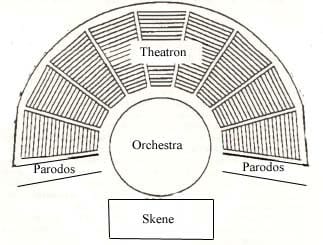 the stepped forward actors would perform here
the stepped forward actors would perform here - Theatron: where the audience sat (all Athenians could and were expected to attend the festival), if there was extra seating, space permitting, non-Athenians or slaves could attend as well
- Altar: where they offered sacrifices to the God Dionysus, always an altar in the plays (makes references to it sometimes)
- Proscenium: only about 5 feet deep, where the actors with actual speaking lines were, usually stayed in their places, stood, delivered lines and chorus sang
- Skene: background building, containing dressing rooms for actors and an entrance on stage
- Backdrop: behind curtains, backstage, not much stage direction, movements, behind curtains
- Exits: stage left or stage right, where performers went in and out
- Much like modern operas
Costumes and masks
- Wore costumes and masks to let the audience know exactly who you were looking at
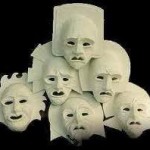
- Could have had male and female parts but all actors were males
- It wasn’t like modern acting where actors conveyed emotions, took away actor’s personalities but with the mask infested them with their role (i.e. king, queen, slave etc.)
- Different masks for comedy and tragedy
- In the interest in the environment (i.e. accent, status), the characters act and talk the same in tragedies
- Modern-day writing encourages a unique depiction of each character but not Greeks
Greek Tragedy: c. 550-400
- All in poetry, sung or spoken
- Spoken scenes for actors, they would occasionally sing but mostly chorus
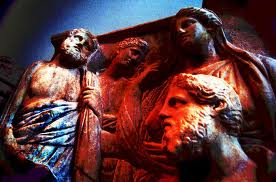
- Most plays are based on old myths the audience knows very well, no original play that the playwright created out of the blue, they embellished long standing myths, make their own mark, make is uniquely theirs, voice a message etc.
- Greek tragedy hard to generalize but usually:
- Hero that experiences catastrophic downfall, some calamity, the downfall is rational, it can be deduced why this person fell, they may be blind, arrogant (not always though), it’s always rational, we can learn from WHY it happened
- We want to be like these heroes, but in Greek culture, it is precisely what you do NOT want to be, a tragic hero is a warning signal for the heroes, i.e. Achilles, do not want to be like him, avoid, the suffering does not make them better, ends up catastrophically destroyed, unredeemed
- The culture of Greek literature: tells, over and again, most stylized, artificial, finely crafted way, like high tide
- Earth’s prophetic navel, belly button of the earth: Delos
- Aristotle says the plot is the soul of the tragedy, characters come second, he never mentions the term tragic hero
Plays and Playwrights
- Not good theatre in contemporary sense, this message keeps repeating itself, it’s grand, profound, but not theatre by our standards
- Only 3 playwrights, 32 plays survive
- All the plays deal with human suffering and human existence
Aeschylus (524-456)
- Life is cruel, but out of cruelty comes a lesson
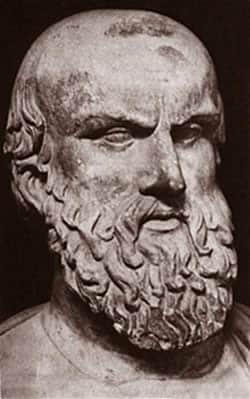
- The Oresteia: Agamemnon, “Men shall learn by suffering, when deep slumber falls, remembered sins drip down on the sore heart with fresh pain, and no welcome wisdom meets within. Harsh is the grace dispensed by powers immortal enthroned on the awful bench.”
- There is something called justice, it exists, it’s out there, it affects all of us (like gravity), what makes his plays peculiar and striking is the way he approaches this law
- Generalization: showing one example of “justice,” Agamemnon murdered his daughter, his wife murdered him, his son felt obligated to murder his mother and the spirits decided to murder him
- When does vengeance ever end? When does bloodshed ever end?
- Protagonist behaves ruthlessly, capacity for unholy deeds that is appalling, the burden of what has gone before is by no means lifted or transmuted by the end
- He’s looking at humans not as particulars but as universals, the theme of justice (like dissecting a frog to generalize the species), the study of justice, it’s not theatre because there’s no action
- Somehow these minor characters contribute to our understanding of human life
- Also wrote a patriotic celebratory tale of the Persian Wars, Persians, not naming one Greek, when man makes haste the god assists, human folly accelerates the fulfillment of the god’s plans
- All killing takes place offstage and is reported later
Sophocles (496-406)
- Justice, pride, interested in these forces, some overall law, how they affect individuals
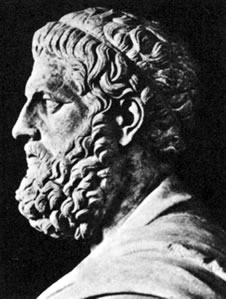
- We see the tragic heroes emerge but trapped by these great forces, we feel sympathize for them, these true heroes, something grand about them, unwilling to accept his fate
- Oedipus Rex: “who murdered the last king?” everyone told him not to ask, he’s unwilling, he has to know, he has to pursue, turns out he murdered his own father, married his mother
- A myth that the audience is already familiar with, known to Homer
- Exploits dramatic irony so ruthlessly, incomparable to any other play
- How much knowledge is too much knowledge, how much are we supposed to know?
- Focuses on how the Gods treats us, how does justice unfold?
- Antigone: King Creon kills Antigone for defying him and burying his political enemy (her brother), she’s betrothed to his son and she commits suicide, his son tries to kill him but misses and kills himself, his wife hangs herself in despair and Creon recognizes that fate has reduced him to less than nothing
Euripides (480-406)
- There is no order, no Gods, if there are, they’re not fair, they don’t care, his question seems to be, “how should human beings
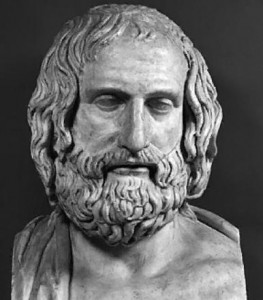 treat each other in this kind of world with no laws, even if you work hard, play your part but still suffer, the hard worker gets no more benefit than the lazy man”
treat each other in this kind of world with no laws, even if you work hard, play your part but still suffer, the hard worker gets no more benefit than the lazy man” - Focuses on when human beings fail each other, the moments we know we didn’t do our best
- In particular, he uncovers moments in Athenian history when they failed, he was skeptic, he didn’t believe in God and was soon exiled because of this
- He entered in the competition 22 times and won only 5 times (once after he died, pity victory)
- He wasn’t as reverenced
- Medea: Athenian man saved by Barbarian woman, and he promises to marry her but when he returns home he disposes of her
- Trojan Women: depicts the mothers/wives of the heroes of the Trojan heroes, these women are captives, to be brought back as slaves. They plead as they watched their children die, since the Greeks were afraid they’d grow up and seek revenge
- Hecabe: story about a mother whose child is to be killed for the sake of the Greeks
- Bacchae: written after Euripides was exiled, about a man who doesn’t believe in God, but both him and his mother are driven mad by the Gods and she tears him into pieces
- Sheds tragedy of excess weight, gives women, slaves a voice, made truly democratic
- Ironic part, after attacking all aspects of Athenian culture, his last play is about himself, a bit of an apologetic effort, how he suffers in the end
- Responded rather well to open criticism like this
Old Comedy, Aristophanes (485-385)
- Only playwright that survives, but agreed as the greatest
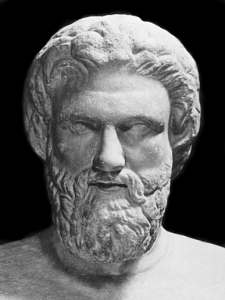
- Generally a happy ending, a restoration, everyone gets what they deserve
- Even leading citizens can be insulted in old comedy, highly vulgar, death, sex, urination, ancient Greeks had high tolerance for abusive speech, only couldn’t say anything bad about Athens as a whole, allowed to say, “this society is corrupt,” but can’t say Athens is wrong, insult to Athena
- Aristotle derives origin of comedy to Kome, a village because comedians were turned out of towns and went strolling around the villages
- A state institution performed at the Great Dionysia and also at a special festival in January, Lenaea
- The only old comedies that survive are the 9 plays plus another 2 different characters by Aristophanes
- Poked fun of political leaders, Cleos who had prosecuted him a year earlier, Jack the sausage seller as good as his master, haggling in the marketplace, indulging with male whores
- Contains satirical figures, but not naming them directly, komodein, to represent meant to satirize, ridicule. There is also a striking amount of sexual indecency
- As if it is a kind of release from normal social embarrassment and inhibition, most plays contain some extravagant fantasies
- The almost prophetic voice of cultural decline, after Athens was defeated and never able to return to its pre-eminence, later comic poet’s uncanny force of prophecy grew
New Comedy; Menander (342-292)
- Play after play you have the same characters, highly predictable, conforms to stereotypes
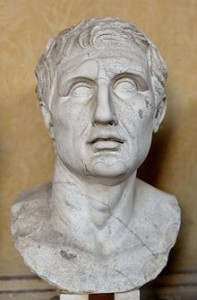
- Stern father, manipulative slave, plot devices, recognition based on necklace or rings, substitution of children or mistaken identity, doesn’t challenge audience, but greatly influences modern drama
- Love at first sight, happy endings, can see a link between these and Euripides` later, more light-hearted plays
- No longer centered around political and state affairs due to loss of independence to Macedonian Empire, focused on realistic depiction of characters
- One complete play of Menander survives, Dyskolos (The Peevish Man)
